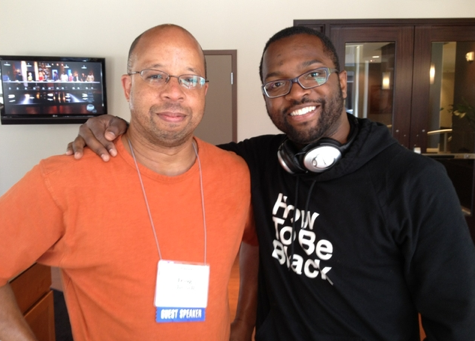After his uproarious keynote speech at the 2012 AAN Convention in Detroit, we caught up with author, comedian and former Delicatessen mayor Baratunde Thurston for a few more words of wisdom on best online practices and how alt-weeklies can become more diverse and inclusive.
One of the last things you said during your speech was that you love alt-weeklies; why do you love them?
I got my writing start at an alt-weekly, so I have selfish reasons to support them. That was the Weekly Dig in Boston; gave me a column, twice a month. It was the first time I had a professional editor, that I got paid anything resembling something respectable and it helped me develop my voice. So, that’s a little selfish reason.
The other is that I think they occupy a unique and valuable space in specifically cities. My other introduction to them was checking the authority of other media. And so being able to call out other outlets out on their B.S. is really useful; they have a certain irreverent tone and they tend to cover things that are left by the wayside of major organizations. They’re closer to the ground; they’re kind of the space between, like a hoity-toity outlet—which almost feels too good to do certain things—and just rabble, which doesn’t know how to do certain things. So, it’s this alternative voice.
Plus, they’re just fun! They’re more fun. They’re just better. And they’re probably better people—they definitely have more attractive people.
One of the big issues at the convention and at alt-weeklies in general has been embracing the internet and getting better at digital storytelling, which is what your talk was about. What do you hope people took away from your presentation?
Oh, um, first of all, don’t be racist. Or, you know what? Be less racist. Because it can be a big leap for, like, super racist people to just stop being themselves. But we can take little baby steps. So, that would be the most important one.
In terms of digital storytelling, always think before you tweet. That’s a good one; that’s a really good one, for anybody, not just journalists.
But think about the platform and all that it has to offer, all the features—list making, following, reblogging, the linking—what can you do with your story on this platform that you can’t do on another? That copying and pasting from one to the other is not, that’s just not interesting. To anybody.
We’re in a very desperate grab for people’s attention, and how do you stand out, how do you maintain that attention to some degree depends on how well you speak the language of the platform that you’re on or how engaging you are with that community and that’s the second point, which is try to experiment with ways to engage people that go beyond the comments, “i-reporting” type stuff.
There are other ways to bring people into the process through the writing, through the internet, through physical events that, especially for an alt-weekly—which is so much part of the voice of a city. There are things that they can do that a big national site, like a Huffington Post, can’t. Because it’s not identifying with a location.
If you are Cleveland’s finest voice on the arts, you have some credibility that very few others can have and you can have a convening power to bring folks together from a physical community that will always be valuable.
Going back to what you said about race, diversity and inclusion has become a huge issue that AAN has taken up and there were also some sessions regarding that during the convention. What would be your advice as far as diversity and inclusion, not only in the newsroom, but also in terms of news coverage?
Yeah, we should be very diverse in our newsrooms and our coverage. I agree with that. Beautiful. Really good idea. I’m glad you guys are doing that.
But how do we do it?
Recruit young, young, young people. Go to high schools, create programs that remind people that this is a profession, that it’s a community you can join. Have internships—a ton of them—and you kinda gotta get people early. Beef up the supply chain of talent and the people who know this career exists and recruit from non-obvious places.
Just find people who know how to tell a story, who not necessarily went to journalism school—I think that’s less an issue in the alt-weekly world, but maybe not as much.
The one thing I’d say is target little, brown children. Target them with newspapers. Beat them up with your newspaper. They’ll never forget you.
Are there any last general thoughts that you’d like to express?
So, there will be a race war. It’s coming, I think it’s January—it’s either the 13th or the 15th; I can never remember. I wish I knew, but I’m giving you a range—I hope that’s helpful.
To find more from Baratunde, follow him on Twitter and check out his blog at Baratunde.com.








